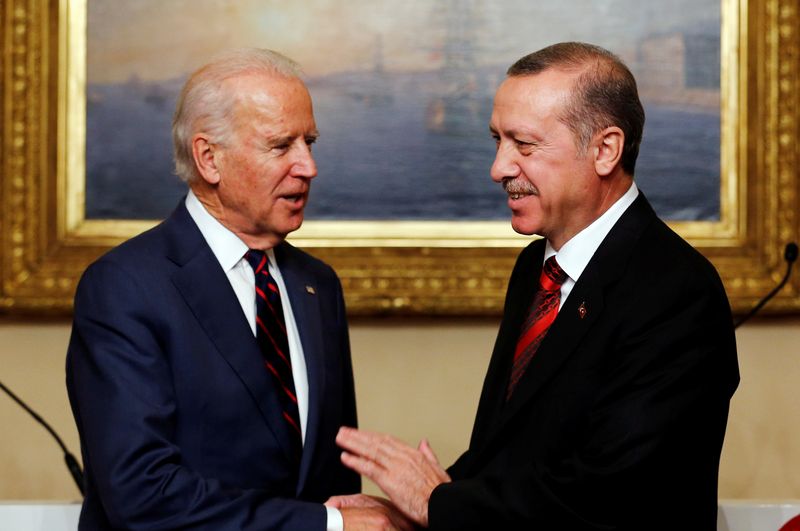By Jonathan Spicer
ISTANBUL (Reuters) - Turkey stands to lose more than most other countries if Joe Biden is elected president since he is expected to toughen the U.S. stance against President Tayyip Erdogan's foreign military interventions and closer cooperation with Russia.
Investors and analysts say the beleaguered Turkish lira is especially vulnerable if a Biden White House pulls the trigger on long-threatened sanctions over Ankara's purchase of Russian S-400 missiles, which Washington says compromise NATO defences.
An apparent S-400s test last week prompted a furious response from the State Department and Pentagon. Top Republican and Democratic U.S. senators also called for sanctions that could hobble a Turkish economy hit by two slumps in as many years.
Erdogan has downplayed possible fallout and promised counter-sanctions.
The American threats have rung hollow since Moscow shipped the weapons to Ankara in mid-2019, largely because President Donald Trump has resisted punishing Erdogan, with whom he has regular calls, saying he hopes talks will resolve the issue.
Erdogan has leveraged his warm ties with Trump to flex military muscle in Syria, Libya, the Eastern Mediterranean and this month in Nagorno-Karabakh, filling some gaps left by a U.S. retreat from the region in recent years.
But the relationship could cool if Biden, the Democratic candidate and front-runner, wins the November 4 election.
In remarks that drew sharp criticism from Ankara, Biden in December advocated a new approach to the "autocrat" Erdogan and fretted over close Turkish cooperation with Russia.
Biden has said little specifically about the issue recently and his campaign did not respond to a request to comment. His platform calls on "all NATO nations to recommit to their responsibilities as members of a democratic alliance."
The lira, down 24% this year to all-time lows, already partly reflects the Biden risk, investors say. Any decisive rebound in Turkish assets may be delayed until after the vote when the White House decides whether, and perhaps how, to sanction Turkey.
"A Biden victory would certainly increase the risk of U.S. sanctions ... and of course you'll have anxiety returning to an already unstable financial market that has been hit by the pandemic," said Roger Kelly, lead regional economist at the European Bank for Reconstruction and Development.
The lira's slide is due mostly to depleted FX reserves at the central bank, double-digit inflation and what Moody's (NYSE:MCO) says is a balance-of-payments risk.
Yet the U.S. election has loomed in the background: the latest currency selloff began in July, when Biden's near 10-point lead in polls solidified. A Turkish government spokesperson did not immediately respond to a request for comment.
For a graphic on Emerging market currencies split by U.S. election risk:
https://fingfx.thomsonreuters.com/gfx/mkt/dgkpljmelpb/Pasted%20image%201602583295562.png
Some investors say now that $13.5 billion has been pulled from Turkish bonds and stocks this year there's good reason to invest, especially after the central bank began hiking its key interest rate, which is expected to hit 12% on Thursday.
But sanctions over S-400s, now back on the radar, are making some optimists think twice.
"There's justification for owning Turkish hard currency paper. You may have to navigate through some choppiness but ... quite a bit of bad news is already priced in," said Blaise Antin, head of EM sovereign research at Los Angeles-based TCW.
"Yet the Erdogan back channel to the White House will very likely be much weaker" under Biden, he added. "Erdogan is a pragmatic guy. I expect he would try some sort of pivot."
NEW U.S. APPROACH
Turkey's Presidential Spokesman Ibrahim Kalin said this month it would work with any U.S. president yet press him to abandon support for Kurdish militant groups in Syria, and to extradite U.S.-based Muslim cleric Fethullah Gulen who it says orchestrated a failed coup in 2016.
Finance Minister Berat Albayrak has downplayed the fall in the lira, which is near 8 versus the dollar, and he expects Turkey's economy to avoid a contraction this year.
For a graphic on Timeline of Turkish lira's gradual decline:
https://fingfx.thomsonreuters.com/gfx/mkt/yxmvjjnyqvr/Lira%20timeline%20US%20elections.PNG
Foreign holdings of Turkish government debt have fallen to 3% from more than 25% five years ago. Flows briefly reversed after last month's surprise rate hike, but the rally was cut short by reports of the planned S-400 test.
A U.S. House defence spending bill worth hundreds of billions of dollars includes sanctions on Turkey under the Countering America's Adversaries Through Sanctions Act (CAATSA) that is meant to punish countries dealing with Russia.
The Senate could pass it and send it to the White House as soon as December, setting the stage for Biden or Trump to select mild or harsh sanctions next year. Separately last year, Washington suspended Ankara's involvement in an F-35 programme.
Erdogan sees Turkey's NATO membership and its opposition to Russia in conflicts in both Syria and Libya as a check on what any U.S. Administration might do, said Nikolay Markov, senior economist at Pictet Asset Management.
"The U.S. will need to rely on Turkey as the main ally in that region, so that puts a cap on sanctions they can take against Turkey," he said.

(For a lira timeline, click here: https://tmsnrt.rs/3dR1RCY)